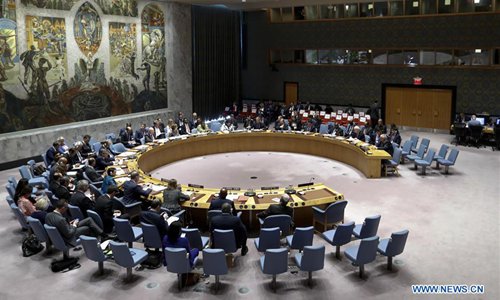US, UK attempts to discuss HK security bill at UN Security Council end in failure

Photo taken on Sept. 25, 2019 shows a UN Security Council ministerial debate. (Photo: Xinhua)
Attempts made by the US and the UK to push the UN Security Council to discuss Hong Kong's national security legislation have ended in failure, with a Chinese envoy slamming it as intending to point fingers at the internal affairs of China for their own political purposes.
After China passed the decision to draft national security law in Hong Kong recently, the US and the UK have pointed fingers, intervened and tried to obstruct its passage, and even tried to push the UN Security Council to discuss it at an open video conference.
The proposal, however, did not receive support from the vast majority of Security Council members, which believed the issue of Hong Kong is an internal affair of China and has nothing to do with the duties of the Security Council. Thus, the Security Council rejected the unreasonable demands of the US, and the US' attempts ended in failure.
Facing such strong opposition among members of the Security Council, the US and the UK could only bring up the topic under the agenda of "other matters" which was strongly countered by China and also generally opposed by members of the Security Council.
The council did not reach any consensus on this issue, and no formal discussion was held. The actions of the US and the UK came to nothing.
Zhang Jun, China's permanent representative to the United Nations, made strong remarks against the attempts of the US and the UK.
He said that the US and the UK arguing about Hong Kong totally confuses right and wrong. As a special administrative region of China, affairs involving Hong Kong are purely China's internal affairs, and no foreign interference is allowed.
The national security legislation of Hong Kong does not pose any threat to international peace and security, and the Security Council should not intervene in any way, Zhang said.
In contrast, Zhang pointed out that since June last year, a series of violent and separatist activities had taken place in Hong Kong, receiving overt support from some foreign forces, which posed a real threat to China's national security.
The National People's Congress' establishing and perfecting of Hong Kong's legal system to guard national security is fully in line with the demand for safeguarding national security, and there is ample evidence that it won't affect the high autonomy of Hong Kong, or the rights and freedoms of Hong Kong residents.
The law will be conducive to the implementation of the "one country, two systems" policy and to the prosperity and stability of Hong Kong, Zhang said.
Zhang said the legal basis for China's governance of Hong Kong is China's Constitution and the Basic Law of Hong Kong, not the Sino-British Joint Declaration.
The UK has no sovereignty, governance or supervision rights over the returned Hong Kong, and nor has the US. Out of ulterior political purposes, the US and the UK have interfered in the affairs of Hong Kong in an undisguised way, supported violent criminals, and threatened the Hong Kong SAR government and bear inescapable responsibility for the violence that has taken place in Hong Kong, Zhang noted.
The crude interference in Hong Kong from the US and the UK is an important reason why China drafted the national security legislation in Hong Kong, Zhang said.
Zhang suggested that the UN Security Council discuss issues related to the US, which is the real source of chaos in the world and poses a real threat to international peace and security.
The US has been engaged in abusing weapons sales around the world and played games of unilateral sanctions, and has also been advocating unilateralism in many ways, withdrawing from the Paris Agreement on climate change, the comprehensive agreement on the Iranian nuclear issue, the Intermediate-Range Nuclear Forces Treaty (INF) and the Treaty on Open Skies.
The Chinese envoy to the UN urged the US and the UK to stop interfering in the internal affairs of Hong Kong, and ending their hegemonic behavior.
No matter what the US and the UK say, the Chinese government won't change its firm resolution in safeguarding national sovereignty, security and interests, in implementing the policy of "one country, two systems" and in opposing any foreign forces' interference in Hong Kong affairs, Zhang said, noting any attempts to interfere in the internal affairs of China using the excuse of Hong Kong are doomed to fail.
